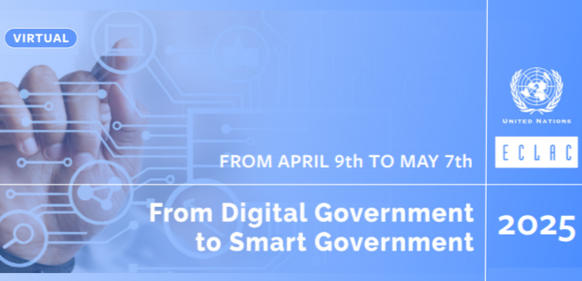From Digital Government to Smart Government
Work area(s)
Topic(s)
The course is organized by the Economic Commission for Latin America and the Caribbean (ECLAC), through the Latin American and Caribbean Institute for Economic and Social Planning (ILPES) and the ECLAC Subregional Headquarters for the Caribbean
Course information

Type of course
Training method
Course language
Geographic scope
Date
Status
Registration date
Financing type
Target audience
General objective
The general aim of the course is to enhance participants’ capacities in providing solutions to the needs of citizens, organizations, and the challenges of future crises, for example those linked to climate change, through Digital Government. The course also focuses on incorporating new knowledge to advance evidence-based decision making and data-driven policies to create public value and aiming to build a path towards a resilient Smart Government in the Caribbean subregion.
Specific objectives
- To provide participants with an overview of the concepts, elements, conditions, benefits, and impacts of Digital Government on the path to Smart Government.
- To equip participants with the necessary skills for designing and implementing digitalization projects or programs in priority areas of service delivery.
- To enhance participants’ abilities to manage information technologies which facilitate the transformation of processes that have a high impact on the citizens.
- To equip participants with the basic technical knowledge for the integration and utilization of data.
- To strengthen the abilities of participants to manage innovative technologies and their technical language to enable them to better communicate with the technical entities within their organizations.
Course Methodology
The course is asynchronous, but also includes virtual sessions. Under this modality, the contents are developed according to a set of learning objectives focused on the participant. The course is structured in three thematic modules and a final assignment. The contents of each module are uploaded to the e-learning platform, Moodle, as lessons, which include an overview of the module and course material utilizing various elements and media, such as interactive texts, graphics, audio, and video. The final assignment seeks to apply the knowledge gained during the course in the investigation of a real-world situation within the government, sector, or institution of interest to the participant that can be considered as a basis for the development of a potential Digital Government project.
Duration of the course
The duration of the course is four weeks, from April 9 to May 7, 2025. The projected workload is five hours per week for a total of 20 academic hours.
Applications
Those interested in applying for the course should complete an online registration form available at the following link: https://forms.office.com/e/X06rpKZYUK
Applications will be accepted until Friday, March 28th, 2025. Submissions received after this date will not be considered in the selection process. Between March 31st and April 2nd, 2025, those selected will receive confirmation of acceptance to the course via email from the selection committee. Recipients of this email must confirm their participation in the course by Friday, April 4th, 2025.
Failure to confirm participation will result in the inclusion of additional applicants who meet the criteria for the course.
Programme
MODULE I: THE IMPORTANCE OF DIGITAL GOVERNMENT STRATEGIES
Objectives:
- Understand the changes associated with the information society and the digital transformation of institutions.
- Reinforce the need for digital transformation strategies (DTS).
- Review key digital initiatives to transition towards a smart government.
MODULE II: GOVERNMENT DATA AND ITS GOVERNANCE
Objectives: Know and apply the necessary elements for data governance.
MODULE III: TOWARDS A SMART GOVERNMENT
Objectives:
- Internalize the definitions of smart government.
- Understand which methods and technologies facilitate the development of a resilient smart government.
MODULE IV: FINAL ASSIGNMENT: DEVELOPMENT OF A HIGH-LEVEL PROPOSAL
Objectives:
- Apply the lessons to the reality of your country, government sector or organization.
- Identify gaps with respect to the concepts studied.
Country(ies)
- Caribbean
Attachment(s)
Related link(s)
Organized by
Instituto Latinoamericano y del Caribe de Planificación Económica y Social (ILPES), CEPAL
- http://www.cepal.org/ilpes/
- (56-2) 2102507